The problem
I'm working on a custom OS for an ARM Cortex-M3 processor. To interact with my kernel, user threads have to generate a SuperVisor Call (SVC) instruction (previously known as SWI, for SoftWare Interrupt). The definition of this instruction in the ARM ARM is:

Which means that the instruction requires an immediate argument, not a register value.
This is making it difficult for me to architect my interface in a readable fashion. It requires code like:
asm volatile( "svc #0");
when I'd much prefer something like
svc(SVC_YIELD);
However, I'm at a loss to construct this function, because the SVC instruciton requires an immediate argument and I can't provide that when the value is passed in through a register.
The kernel:
For background, the svc instruction is decoded in the kernel as follows
#define SVC_YIELD 0
// Other SVC codes
// Called by the SVC interrupt handler (not shown)
void handleSVC(char code)
{
switch (code) {
case SVC_YIELD:
svc_yield();
break;
// Other cases follow
This case statement is getting rapidly out of hand, but I see no way around this problem. Any suggestions are welcome.
What I've tried
SVC with a register argument
I initially considered
__attribute__((naked)) svc(char code)
{
asm volatile ("scv r0");
}
but that, of course, does not work as SVC requires a register argument.
Brute force
The brute-force attempt to solve the problem looks like:
void svc(char code)
switch (code) {
case 0:
asm volatile("svc #0");
break;
case 1:
asm volatile("svc #1");
break;
/* 253 cases omitted */
case 255:
asm volatile("svc #255");
break;
}
}
but that has a nasty code smell. Surely this can be done better.
Generating the instruction encoding on the fly
A final attempt was to generate the instruction in RAM (the rest of the code is running from read-only Flash) and then run it:
void svc(char code)
{
asm volatile (
"orr r0, 0xDF00 \n\t" // Bitwise-OR the code with the SVC encoding
"push {r1, r0} \n\t" // Store the instruction to RAM (on the stack)
"mov r0, sp \n\t" // Copy the stack pointer to an ordinary register
"add r0, #1 \n\t" // Add 1 to the address to specify THUMB mode
"bx r0 \n\t" // Branch to newly created instruction
"pop {r1, r0} \n\t" // Restore the stack
"bx lr \n\t" // Return to caller
);
}
but this just doesn't feel right either. Also, it doesn't work - There's something I'm doing wrong here; perhaps my instruction isn't properly aligned or I haven't set up the processor to allow running code from RAM at this location.
What should I do?
I have to work on that last option. But still, it feels like I ought to be able to do something like:
__attribute__((naked)) svc(char code)
{
asm volatile ("scv %1"
: /* No outputs */
: "i" (code) // Imaginary directive specifying an immediate argument
// as opposed to conventional "r"
);
}
but I'm not finding any such option in the documentation and I'm at a loss to explain how such a feature would be implemented, so it probably doesn't exist. How should I do this?